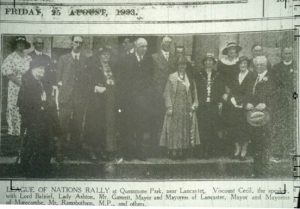The election of W. J. Garnett Esq. of Quernmore Park, near Lancaster, ex-diplomat, ex-social worker, and country landowner, as the Lancaster League of Nations Union (LNU) President in 1933 meant that the branch’s summer ‘garden meeting’ could be held in an idyllic setting and have Viscount Cecil, the League of Nations Union President, to speak. 800 people assembled to hear a speech informing them about the League of Nations and to inspire them to spread the message. Among those attending were Lord and Lady Balniel, Lady Ashton, civic dignitaries from Lancaster and Morecambe, the current Conservative and the former Liberal MPs for Lancaster, the Labour candidate having sent his apologies, and LNU officials. Lord Cecil presented the case for the League of Nations and cited the particular case of his golf caddy, an ex-serviceman left destitute after the end of hostilities, the consequent need for a ‘Peace Mind’ to counter further aggressive nationalism leading to war, and argued for disarmament, currently relevant owing to the disarmament talks in Geneva.
The seriousness of the morning’s speeches was offset by a garden party atmosphere, showing that the LNU was able to reach the ordinary person, with an emphasis on youth activities. Games and competitions were held, displays performed by members of Scout, Guide and Lads’ Clubs groups, essay and poster competitions judged and prizes awarded. To emphasise that the LNU could reach the ordinary person, Lancaster LNU branch members enacted a scene from the previous year’s Peace Pageant.
References/Further Reading:
Lancaster Guardian, 25 Aug 1933.
H. McCarthy, 2011. The British People and the League of Nations. Manchester: Manchester University Press, ch.6.


